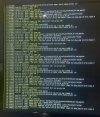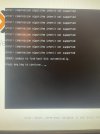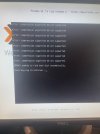My proxmox stopped suddenly, and when I tried to boot it I see "Grub LoadingRead Error" when I boot. My boot disk is ZFS, and I have it across two disks. One is a WD Green 120GB disk and the other is crucial bx 240gb disk, both SSDs.
It took me a while to find the proxmox rescue boot, so before finding it I did the following -
I'm not sure what to do for the next step.
Thanks in advance.
Disk errors when running rescue boot with disks in another machine

rescue boot output -


It took me a while to find the proxmox rescue boot, so before finding it I did the following -
- tried to run from usb ubuntu livecd, then windows on that machine (call it pve01), but booting from USB was consistently hanging.
- at this point I probably should have run proxmox rescue boot, but I didn't find that until later.
- load ubuntu on another machine, call that ubuntu01
- swap my two boot disks into ubuntu01
- `zpool import -f rpool` and then scrubbed the pool (no errors).
- I needed to do -f because I didn't export the pools first (because I couldn't boot)
- SMART tests long/short on both disks are ok.
- check sata cables on pve01 - all seem fine.
- find Rescue Boot
- Boot from proxmox install disk on ubuntu01, run rescue boot
- I can boot into command line of proxmox, but since it is on another machine some things can't work, and I'm getting disk errors.
- I'm not sure - are the disk errors because I have these disks in another machine, or is this my problem?
- swap the disks back into pve01 machine
- Try to boot - same error, "Grub LoadingRead Error"
- Run rescue boot from proxmox 7 install disk.
- "error" compression algorithm 68 not supported" displayed 8 times.
- "ERROR: unable to find boot disk automatically." then "Press any key to continue..."
- Run rescue boot from proxmox 8 install disk (I think I have 7 but honestly don't know - maybe I updated to 8).
- "error: compression algorithm inherit not supported" displayed 8 times
- "ERROR: unable to find boot disk automatically." then "Press any key to continue..."
- I do have PCIe passthrough configured. I did this about August 2021 (instructions look different now).
- I do have a copy of my /etc/default/grub from when I did this.
I'm not sure what to do for the next step.
- Is there a way to help it find the boot disk in rescue disk on the true host system pve01?
- Is there some repair I can do from the command line on ubuntu01 booting into proxmox 7 rescue boot?
- Because I'm seeing 'auto reallocate failed' in the disk section, I'm considering cloning the disk to another ssd to see if that helps?
Thanks in advance.
Disk errors when running rescue boot with disks in another machine

rescue boot output -



